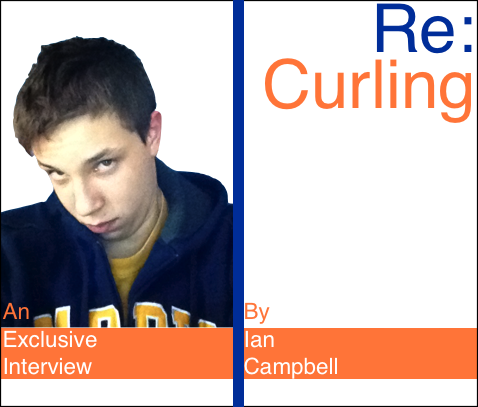I caught up with Liberty, Maine resident Brian Morris. The 38 year old club curler was enthusiastic about the sport he loves, and he even hopes to compete in the 2018 Olympics*. *Okay, I hope he competes in the 2018 Olympics.
Here’s what he had to say:
Ian Campbell: When did you become interested in curling?
Brian Morris: I first became interested in curling during the 2006 Olympics. I had never heard of it before that. We moved to Maine a year and a half ago and I found out that there was a curling club about 25 minutes away. I went to a “Learn To Curl” event at the club in Jan 2013. I joined the club this fall as a full member.
IC: What do you find appealing about the sport?
BM: There are many aspects of curling that make it a great sport. I enjoy anything that involves strategy and curling is all about strategy. And, the strategy is not only for this shot, or this end, but for the whole match. I also like that everyone on the team is involved and everyone’s role is equally important. An appealing aspect of playing is that there is very little downtime. You are either working on getting your stone down the ice, strategizing about your next shot, or watching how your opponents stones are going so you can use that information for your next shot. I also like that it can be adapted so that anyone can play. At my club we have curlers from 18 years old to 75.
IC: Why do you think curling is mocked by many Americans, and not regarded as a “real” sport?
BM: First of all I don’t think people understand it, and as Americans what we do not understand we fear. Secondly, we think “how hard can that be?” Let me tell you, if you give it your all, you will be sore the next day.
IC: How difficult is curling?
BM: It really depends on what you are doing at the moment. When delivering the stone, judging how much weight you are throwing is extremely difficult. The difference in power between ‘hogging it’ (not making it over the hog line) and throwing it all the way through ‘the house’ is a very fine line. When sweeping, it is very physical and tiring. Usually you have to sweep the hardest when you are close to the house. Of course by that point your arms are burning. You are also trying to judge the weight that was thrown so you can communicate that to your skip so that he can make a judgement call on whether you should sweep or not. Then there is the difficult job of ‘reading the ice’. The ice is pebbled for every game. It is always different. And it can change throughout the game. In some places the stone will curl more. In others it will run straighter. Really the whole game is difficult but that is why I like it. It is a real challenge, mentally and physically.
IC: What do you think is the future of curling in the US?
BM: I think it will continue to grow on the club level. As people discover there are clubs near them I think they will give it a try and the appreciation of the sport will continue to grow. There are new clubs being opened every year.
IC: What do you think about USA’s poor showing in Sochi?
BM: I think some things need to change. Right now club teams compete against one another to go to the Olympics [in a sort of playoffs]. So you might not necessarily be getting the best players on one team. Other countries cherry-pick their best players for an ‘All-Star’ team–you see this in Olympic hockey and basketball for all countries. The other problem is that US curlers are not sponsored until they qualify for the Olympic team. Until then they have to work jobs and curl in their free time. We will never be able to compete on the international level while this is the case.
IC: Will you compete in the 2018 Olympic games?
BM: No. I will not have time to devote to curling to gain the experience necessary or to travel to the numerous events required to gain national exposure.
 Ian Campbell is a writer that contributes to We The Campbell’s regularly. He hasn’t graduated anything except if you count kindergarten and grades 1-8, and he is still able to play sports, unlike most sports writers published in Sports Illustrated.
Ian Campbell is a writer that contributes to We The Campbell’s regularly. He hasn’t graduated anything except if you count kindergarten and grades 1-8, and he is still able to play sports, unlike most sports writers published in Sports Illustrated.
